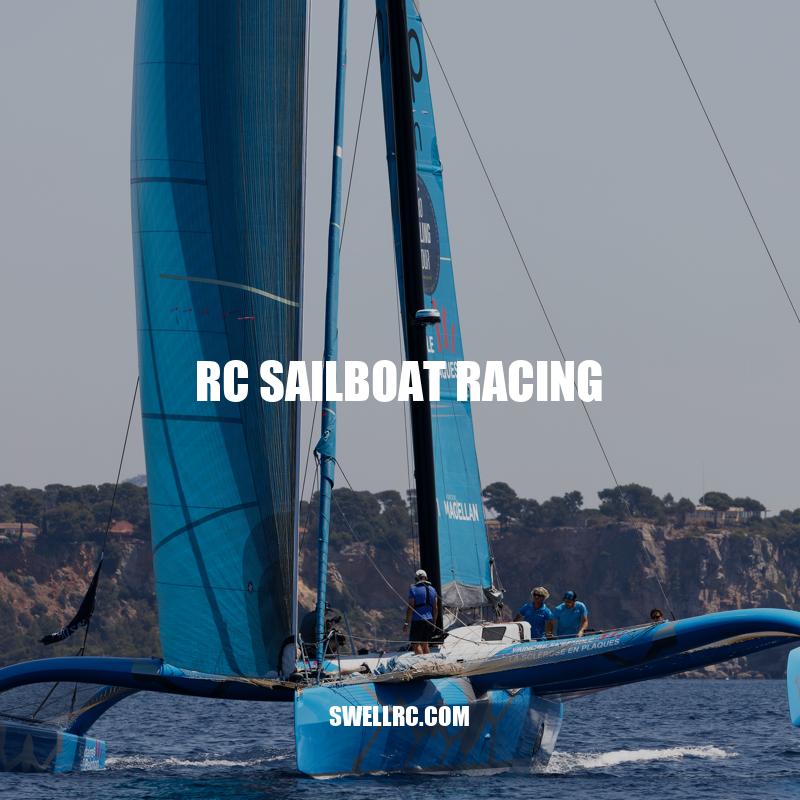RC Sailboat Racing: A Guide to the Exciting Hobby and Essential Skills
RC Sailboat Racing: An Exciting and Engaging Hobby
RC sailboat racing is an engaging and exciting hobby that is enjoyed by people all over the world. This activity involves racing small model sailboats against other competitors in a controlled setting, usually on a large body of water such as a lake or a pond. What makes this hobby so appealing is the combination of sailing skill, strategy, and the ability to handle changing wind and water conditions.
To get started in RC sailboat racing, you need to buy an RC sailboat. There are many different types and models of sailboats available, so it’s important to choose one that suits your skill level and racing needs. Beginners may want to start with a simple model, while more advanced sailors may prefer a more complex model that offers greater speed and maneuverability.
Once you have your sailboat, the next step is to learn how to navigate the water and handle the wind. This requires a good understanding of the effects of wind direction and current on your boat’s speed and maneuverability. Good boat handling skills are also essential to avoid collisions and maintain momentum. In addition, because racing involves more than just sailing skill, it’s important to develop sound strategies for success. Knowing when to tack or gybe, which side of the course to sail on, and how to position yourself relative to other boats are all crucial elements of RC sailboat racing strategy.
Choosing the Right RC Sailboat
Choosing the right RC sailboat for your needs is essential. Here are some key points to keep in mind when selecting your sailboat:
- Choose a model that’s appropriate for your skill level. If you’re new to RC sailboat racing, consider starting with a low-priced and simple model like the Joysway Dragon Force 65 or the DragonFlite 95. These boats are affordable, easy-to-assemble, and provide excellent value for money.
- Consider the size and weight of the boat. Larger boats are generally faster on the water, but can also be more difficult to control. Lighter boats can be more maneuverable, but can be more susceptible to wind and water conditions.
- Look for a boat with features that suit your racing needs. Some models come with features like adjustable sails, ballast tanks, or digital controls that can give you an edge on the water. Others are designed to provide higher speeds and greater stability in changing wind conditions.
- Compare prices and read reviews. There are many great RC sailboat brands and models available on the market. Take the time to research customer reviews, compare prices, and choose a model that’s right for your budget and racing needs.
Remember, choosing the right RC sailboat is only the first step in becoming a successful sailor. Investing in quality equipment, training, and practice are all crucial elements of success in RC sailboat racing. To learn more about selecting the best RC sailboat for your needs, check out websites like RC Sailboat Guide or Radio Sailing Shop for more information and product recommendations.
What is the significance of a sailboat?
A sailboat is a water vessel that utilizes sails to generate propulsion through the wind. It holds significant cultural, economic, historical, and recreational importance. Some reasons why sailboats are significant include:
- Historical value: Sailboats served as the primary mode of transportation, trade and exploration for centuries and played a crucial role in shaping human history and cultures.
- Recreation: Sailboat racing is a competitive sport with enthusiasts, clubs, and events worldwide. Sailing is also a popular leisure activity.
- Environmental factor: Sailboats do not use fossil fuels, which makes them a sustainable and environmentally friendly mode of transportation.
- Symbolic value: The image of a sailboat can represent freedom, adventure and escape from the mundane.
If you want to experience the joys of sailing and discover more ‘sailing adventures’, you can visit sailing websites such as Sailo, SailingEurope, or Boatsetter.
Handling Wind and Water in RC Sailboat Racing
RC sailboat racing doesn’t just require sailing skill, it also requires a good understanding of wind and water conditions. Here are some tips for handling wind and water conditions during a race:
- Pay attention to the wind direction and strength. Use the telltales on the sail to monitor wind direction and adjust accordingly.
- Be aware of the current and how it’s affecting your boat’s speed and maneuverability.
- Stay alert for shifts in the wind and changes in water conditions. Watch other boats and adjust your strategy accordingly.
- Learn how to tack and gybe efficiently. Practice maneuvering your boat through different wind angles and directions.
- Use your boat’s rudder to steer and maintain course. Adjust the rudder position to compensate for wind and water conditions.
Interesting fact:
Did you know that RC sailboat racing has been around since the 1930s? The first RC sailboat races were held in England and the United States, and the sport has been growing ever since.
Common RC Sailboat Racing Terms
| Term | Definition |
|---|---|
| Tacking | A sailing maneuver where the boat turns the bow of the boat through the wind so that the sail switches from one side to the other. |
| Gybing | A sailing maneuver where the boat turns the stern through the wind so that the sail switches from one side to the other. |
| Windward | The direction the wind is coming from. |
| Leeward | The direction the wind is blowing towards. |
To learn more about handling wind and water conditions during RC sailboat racing, check out websites like SailZing or RadioSailing.net for more information and tips on sailing strategy and techniques.
How do racing sailboats go faster than the wind?
Racing sailboats can go faster than the wind by utilizing the principles of aerodynamics and physics. When sailboats are inclined at a certain angle, their sails can create lift and a force that propels them forward, even against the wind.
Some methods that sailboat racers use to achieve higher speeds include:
- Shaping sails to maximize aerodynamic efficiency.
- Adjusting the sail angle and boat direction to optimize wind flow around the sails.
- Using different sail types and sizes based on wind conditions.
- Reducing weight and drag by streamlining the boat and crew movements.
Overall, the goal is to find the sweet spot where the boat is maximally efficient at converting wind into forward motion. For more information on sailing techniques and equipment, websites like Sailing World and Cruising World offer a wealth of resources and product reviews.
Strategies for RC Sailboat Racing
RC sailboat racing involves more than just sailing skill. It’s also a strategy game. Here are some key strategies to keep in mind during a race:
- Pick the right starting position. Look for a clear path to the first mark and position yourself to take advantage of the best wind.
- Keep an eye on other boats. Watch their positioning and try to anticipate their moves.
- Use wind shifts to your advantage. When the wind shifts, adjust your course to get the best possible angle.
- Take calculated risks. Sometimes it pays off to take a chance on an alternative course or maneuver.
- Keep a steady pace. Avoid drastic changes in speed or direction that can slow down your boat or cause it to lose momentum.
Interesting fact:
Did you know that there are specialized RC sailboats for racing? These boats are designed specifically for speed, maneuverability, and racing performance.
If you’re interested in learning more about RC sailboat racing strategies, resources like the RC Sail website or forums like RC Groups can provide detailed information and advice on sailboat racing techniques and tips.
Here are some common RC sailboat racing tactics:
| Tactic | Description |
|---|---|
| Leeward Trap | The boat downwind during the race covers and disturbs the wind flow to the boat ahead, which makes them slow down. |
| Tacking Duel | When two boats try to outmaneuver each other by tacking in quick succession. |
| Luffing | A maneuver to force another boat to slow or turn, either by causing them to sail off course, slow down, or stop. |
What are the tips for sailing racing?
Tips for Sailing Racing:
- Practice, practice, practice – hone your skills and learn the intricacies of your boat and the water you’ll be racing in
- Keep an eye on the weather – wind, waves and currents can all impact your race, so make sure you’re prepared and adjust your strategy accordingly
- Get your crew on the same page – communication and teamwork are key to a successful race, so make sure everyone knows their roles and is working together towards a common goal
- Keep it simple – don’t over-complicate things with elaborate plans or too many variables. Stick to what you know and do it well
- Stay focused – eliminate any distractions and keep your focus on the race at hand. Stay alert and be ready to adapt to changing conditions
If you’re looking for more in-depth information on sailing racing, websites such as Sail Magazine or Sail World offer a wealth of articles, tips, and advice from experienced sailors. Additionally, products such as the Sail Racing App can help you analyze weather conditions and optimize your racing strategy.
RC Sailboat Racing Communities
Participating in RC sailboat racing can be a great way to meet and socialize with fellow enthusiasts. Here are some ways to connect with other RC sailboat racing enthusiasts:
- Join a local sailing club: Sailing clubs are a great way to get involved with the local sailing community and participate in organized races and events.
- Attend RC sailboat racing events: Many communities host races and regattas throughout the year. Attending these events is a great way to meet other sailors and learn more about the sport.
- Join online forums and social media groups: Online communities like RC Groups, Facebook Groups, and Reddit offer a wealth of knowledge and resources for RC sailboat racing enthusiasts.
If you’re looking for a specific type of RC sailboat for racing, websites like Sail RC offer a wide range of boats for sale. These boats are designed specifically for racing and can provide a competitive edge on the water.
Many local sailing clubs, websites and social media groups also offer resources and advice for beginners, from boat maintenance and modifications, to racing tactics and strategies.
Overall, being part of an RC sailboat racing community can be a rewarding experience for anyone interested in trying out this exciting hobby.
Why sailing is a great hobby?
Sailing is a great hobby for many reasons:
- It allows you to connect with nature and experience the beauty of the open sea.
- You can learn new skills such as navigation, wind and water direction and sail handling.
- Sailing offers a great sense of freedom and independence, as you are in control of your vessel and destination.
- It can be a great way to exercise as it requires physical activity.
If you are interested in taking up sailing and want to learn more, there are many online resources available such as sailing websites, forums and online courses. Some popular ones include Sailing World, Sail Magazine, and US Sailing. You can also find sailing gear and equipment online at websites such as West Marine or Defender.
Conclusion
In summary, RC sailboat racing is a fun and challenging hobby that can be enjoyed by sailors of all ages and skill levels. It requires a combination of sailing expertise, strategy, and the ability to adapt to changing wind and water conditions. RC sailboat racing offers a variety of options for participation, from joining local sailing clubs to attending events and participating in online communities.
Whether you’re a beginner or an experienced sailor, RC sailboat racing is a great way to meet new people, learn new skills, and challenge yourself. With a wide range of boats available and plenty of resources and support from the sailing community, it’s easy to get started in this exciting hobby. So, why not try out RC sailboat racing today and see where the wind takes you!



